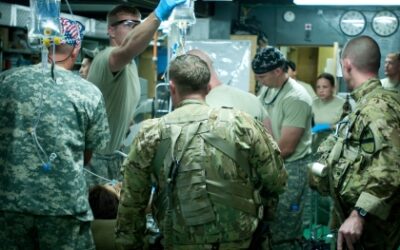What is the association between cardiac autonomic neuropathy (CAN) with incident stroke among diabetes mellitus patients?
Time in Range Beneficial in Patients With Individualized A1c
Individualizing hemoglobin A1c treatment goals in older adults is important to balance risks in benefits, according to a new study.
Deployed Servicemembers Had Lower Cancer Risks Than Those Who Weren’t
Despite concerns about exposure to hazardous material, military personnel who deployed to Southwest Asia actually had a lower risk of dying from cancer than their colleagues who were never deployed, according to a new study.
Elevated Preoperative Glucose Level Linked to Adverse Effects in Hernia Repair
An estimated 1 in 10 Americans and 1 in 4 veterans has diabetes, not only putting them at increased risk for problems such as heart and kidney disease, but also making them more prone to complications such as infection and bleeding following surgery.
Genetics Play a Role in Severe PTSD in Some Deployed Soldiers
The risk for specific soldiers to have severe post-traumatic stress disorder (PTSD) appears to far predate their deployment. In fact, some military personnel are born with it, according to a new study.
Promotion Delays Affecting Military Readiness But Senator Won’t Budge
Delays in promotions directly impacts military readiness, DoD officials have said. But there isn’t much they can do about it as long as Sen. Tommy Tuberville (R-AL) is blocking the expedited promotion of more than 150 military generals and flag officers
Mental Health of Veterans Before, During and After COVID-19 Pandemic
With work disruptions, social isolation and economic concerns, the pandemic understandably caused significant distress for many veterans.
VA Secretary McDonough: PACT Act Claims Numbers Still Too Small
VA has had more than a half-million claims filed under the new PACT Act legislation, which expands care and benefits for former servicemembers exposed to burn pits and other toxic substances during their service.
Republicans Seek to Overturn VA Policy to Provide Abortion Services
Republicans in the House and Senate have reintroduced a resolution to reverse VA’s recent policy change that allows for limited abortion counseling and services at its facilities.
Outpatient Prolonged Exposure Therapy Is Effective for Combat-Related PTSD
Outpatient prolonged exposure therapy, a type of cognitive behavioral therapy that teaches individuals to gradually approach trauma-related memories, feelings and situations, is a fast and effective treatment for combat-related post-traumatic stress disorder (PTSD) in active-duty military and veterans, according to a new study.
VAMCs Struggle to Find Mental Health Staffers for Primary Care
For years, VA has been working to integrate mental healthcare into primary care and requires facilities serving at least 5,000 veterans annually to have a mental health provider available within primary care settings.
Diabetes Drug Metformin Shows Promise for Reducing Incident Osteoarthritis
Metformin is recommended as first-line therapy for Type 2 diabetes at the VA and elsewhere. Among the benefits, according to the VA PBM, is that the drug, which has been in use for decades, is low-cost and safe to initiate in most patients, even those with moderate renal dysfunction.
Sequential Electrical Stimulation Device Relieves Pain in Veterans Study
Despite changes in physical training routines and equipment designed to reduce musculoskeletal injuries in servicemembers and veterans, veterans experience back and joint pain at a higher rate than their contemporaries who have never served.
Veterans Surviving COVID-19 at Much Higher Risk of Gastrointestinal Disorders
Survivors of COVID-19 are at heightened risk of developing gastrointestinal (GI) disorders within a year after infection compared with those who were never infected, according to a new study of veterans being treated by the VHA.
Most Servicemembers Hospitalized With Exertional Rhabdomyolysis Have Heat Illness
Most hospitalizations in military servicemembers for exertional rhabdomyolysis, a syndrome of muscle breakdown following exercise, are associated with heat illness and present with lower creatine kinase levels than cases without associated heat illness, according to a recent study.
Advanced Liver Fibrosis Increases Risk of HCC Diagnosis
While it is well-understood that both nonalcoholic fatty liver disease (NAFLD) and hepatitis C virus (HCV) infection commonly result in hepatic fibrosis and might lead to cirrhosis, it has not been clear whether advanced fibrosis, determined by measurements of liver stiffness, increases the incidence of hepatocellular carcinoma in veterans.
Native Americans Diagnosed With More Severe HCC
Native Americans are among the racial/ethnic groups who are more likely to be diagnosed with more-severe hepatocellular carcinoma (HCC), according to a new study.
HCC Surveillance Rebounded at VA, Still Low
How did the first two years of the COVID-19 pandemic affect hepatocellular carcinoma (HCC) surveillance and factors associated with completion at the VA?
VA Spent Millions on HPV-Related Cancer But No Vaccination Promotion
Vaccinations for Veterans, Servicemembers Half of Civilian Rate ST. LOUIS—Eligible active-duty servicemembers and veterans have dramatically lower rates of human papillomavirus (HPV) vaccination, placing them at much greater risk of related cancers, according to a new...
Military Surgeons Deployed to Combat Environments Face Moral Injury, Distress
A new VA study may be the first to examine moral injury and distress at the intersection of these populations—that is, military healthcare professionals, specifically surgeons
Higher Melanoma, Other Cancer Rates in Aviators, and Crew Remain a Mystery
Military aviators and the ground crews that service their planes are at a greater risk to develop melanoma and other types of cancer, according to a Pentagon study released last month. Just what factors are contributing to that risk remains unknown, however.
Stimulant Use Could Be a Key Factor in Heart Failure Development
Chronic heart failure affects an estimated 5% of veterans in the VA Health System, and annual mortality in heart failure patients is 15%
HIV Patients Have Worse Long-Term Survival Following Coronary Procedure
The burden of cardiovascular disease among HIV patients has tripled over the past few decades, and cardiovascular mortality has steadily risen.
VA Analysis Sought to Determine Best Approach for Treatment of Alcohol Misuse
A new study sought to determine that. Noting that psychosocial approaches are “the hallmark of treatment for harmful alcohol use,” the report in the journal Addiction added, “We aimed to compare the effectiveness of psychosocial therapy for harmful alcohol use using a network meta-analysis approach.”
Measuring Ability to Resist in Alcohol Abuse Treatment
While about half of patients with alcohol use disorder prefer non-abstinence based approaches to treatment, it is not clear when that approach is beneficial.
Substance Use Disorders Increasing Fastest Among Older Veterans
The past few years have seen significant increases in diagnoses for cannabis and stimulant use disorder at the VA, especially among older adults.
Ovbiagele Focuses on Disparities in Stroke Among Veterans, Others
Many factors play into why some populations have a higher risk of having and dying from a stroke: genetics, blood pressure, cholesterol, diabetes, access to healthy food, lifestyles that do not allow for regular exercise.
Clinicians Puzzled by Sharp Rise in Colorectal Cancer Patients Younger Than 50
Colorectal cancer (CRC) is the third-most-common cancer globally and ranks second as the most-common cause of cancer-related mortality.
Primary Tumor Sidedness Increasingly Important in CRC Diagnosis, Treatment
In colorectal cancer, left-sided colorectal cancer (LCC) is associated with better survival compared to right-sided colon cancer (RCC) in metastatic disease, according to a study involving VA researchers.
Vitamin D Supplementation Shows Promise for Reducing Suicide Risk
Supplementation with Vitamin D appeared to be associated with a reduced risk of suicide attempt and self-harm in veterans, especially those who are Black and have low blood serum levels, according to a VA-funded study.







